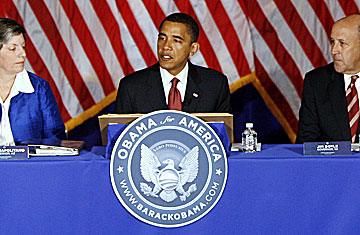
Barack Obama speaks at a Democratic governors economic discussion on June 20 at the Chicago History Museum.
The week did not begin auspiciously for either presidential candidate. On Monday, Barack Obama's normally sure-footed campaign suffered a rare, completely unnecessary embarrassment, when it had to retire the pseudo-presidential seal it had trotted out a few days earlier. The seal — complete with a Latin phrase for "Yes, we can" replacing "E Pluribus Unum" — was such a head-slapping example of gratuitous hubris that you had to wonder whether the opposition hadn't activated a mole inside the Obama campaign. It was an invitation to ridicule that Republicans happily accepted.
But perhaps in another sign that the Democratic nominee leads a charmed political life, Obama's presidential seal gaffe was swept away by the news that one of John McCain's top aides had been quoted saying that a new terrorist attack on U.S. soil before the election "would be a big advantage to him." It didn't matter that Charlie Black, a veteran GOP strategist and Washington power broker, was merely expressing a bit of conventional wisdom about American politics — that voters prefer Republicans over Democrats in times of national security crisis. What mattered was that he made it sound as though McCain were wishing for such a crisis to occur, which is why Black promptly apologized, McCain immediately distanced himself from the remarks and Obama and his many surrogates spent the next 48 hours expressing deep outrage and umbrage.
The week unfurled from there in ways that only solidified the growing sense that the election is quickly becoming Obama's to lose. A series of national polls suggested that Obama's lead over McCain was expanding. Two of them — one by Newsweek, the other by the Los Angeles Times — showed his lead jumping to double-digits. The McCain campaign quickly — and rightly — criticized the polls' methodology, claiming each over-sampled self-identified Democrats. Other polls, like those by Gallup, Rasmussen and Time, suggest a narrower race. But the Obama folks capitalized on the perception shift by dispatching campaign manager David Plouffe to Washington, where he gave a 12-slide PowerPoint presentation demonstrating just how confident they are. Plouffe identified 18 "battleground" states, all but four of which (Pennsylvania, New Hampshire, Michigan and Wisconsin) voted for Bush in 2004. "Our strategic orientation now is to play offense," Plouffe said with a trace of a smile. He added: "The point is, we have a lot of different scenarios to get to 270" — the number of electoral votes needed to win.
As Obama assumed the role of front-runner, the press this week began to take note, in some cases disapprovingly, of the presumptive Democratic nominee's efforts to shuffle to the political center. As any Republican will tell you, the National Journal ranked Obama the most liberal member of the Senate. And in the primaries Obama took routinely liberal positions on all the major issues of the day. But in tone as well as in substance, Obama has started making the traditional general election move to the middle. His first television spot of the general election was biographical, focusing on his love of family and country, and highlighting his legislative efforts "to move people from welfare to work" and "cut taxes." Much to the dismay of many liberals, Obama supported the bipartisan compromise worked out this week on so-called FISA legislation that allows the Bush Administration to continue its wiretapping program. Obama was also conspicuously centrist, even conservative, in his reaction to two major Supreme Court rulings this week — the first disallowing the death penalty in cases of child rape, and the second affirming that the Second Amendment guarantees individuals the right to own guns for self-defense. Obama criticized the first decision, saying he supports the death penalty for such a heinous crime; his response to the gun ruling was muddled, but it made clear that he supports an individual's right to own a gun.
Obama capped the week in Unity, N.H., his arm carefully touching the back of his erstwhile rival, Hillary Clinton, as they waved together to the crowd and the cameras in a smoothly choreographed hatchet-burying ceremony. Though Bill was still off sulking, the prospect of the Clinton machine buttressing Obama's army of supporters and donors made many a Republican swallow hard.
There was some positive news for John McCain this week. As the price of oil keeps climbing, so too, it seems, does the public's support for new oil drilling. At the very least, McCain's combination of aggressively pushing for new drilling and making bold proposals for ways to encourage development of alternative energy is helping him look strong and proactive on an issue that might otherwise benefit the Democrat. And, of course, the Administration's surprising deal with North Korea over the disclosure of its nuclear activities has the potential to give a boost to President George W. Bush's dismal poll ratings, which weigh like an anchor on McCain's campaign.
Still, any week that includes a column by noted conservative John Fund in the Wall Street Journal entitled "No, McCain Isn't Doomed" can't be counted as a particularly good one for the Republican nominee. As one McCain insider told me: "Are we behind? Yes. Are we falling further behind? Yes. But I still think we can win this."
